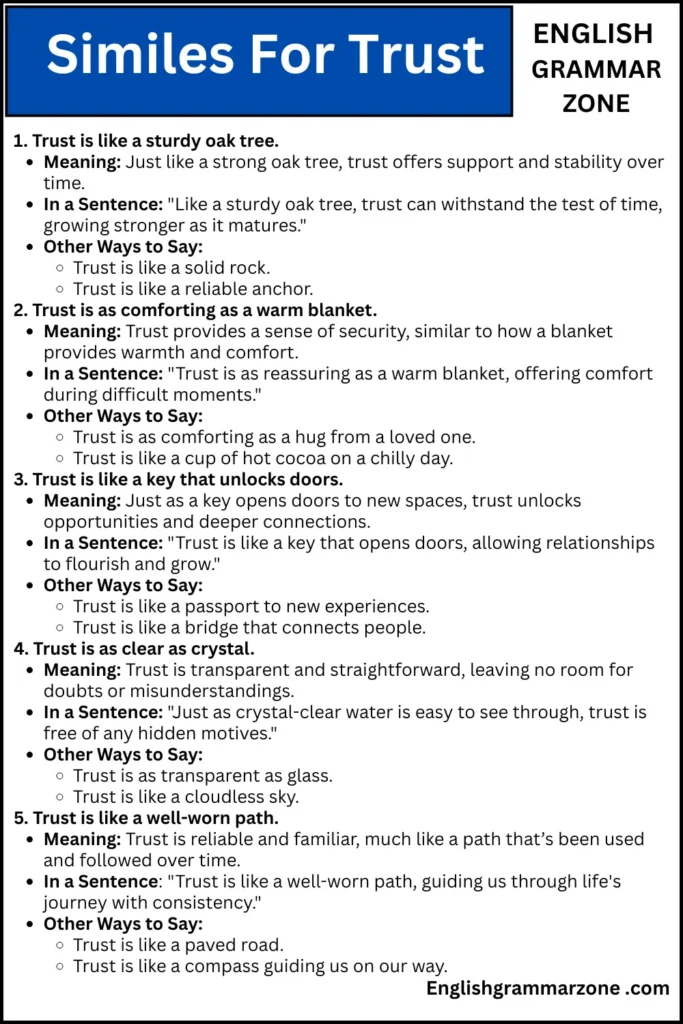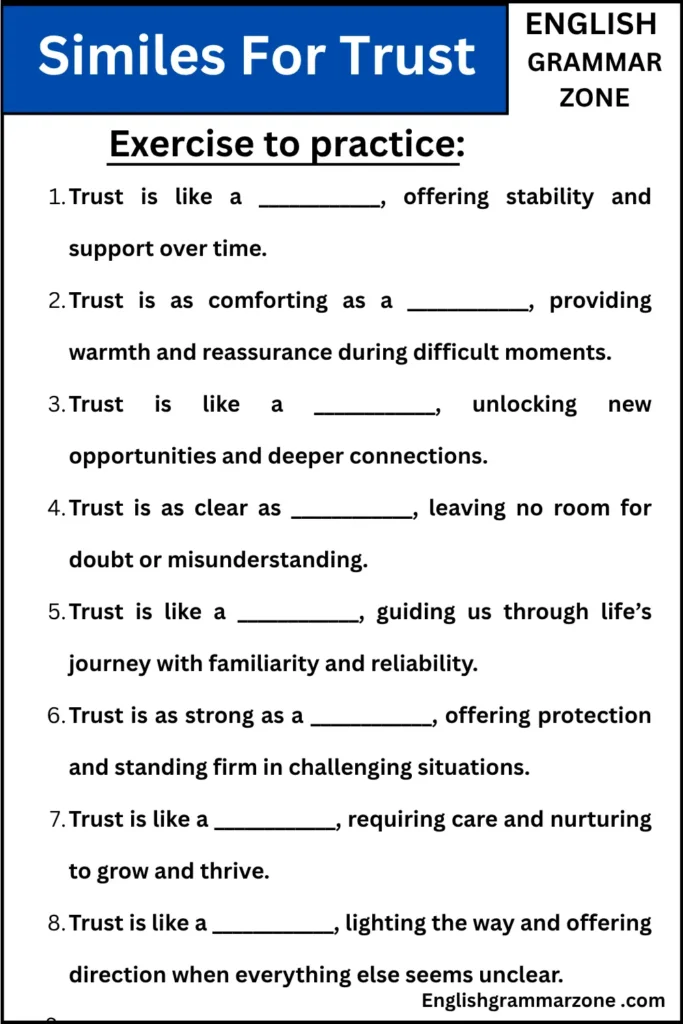Trust is an essential part of every relationship. Whether it’s in personal connections or professional interactions, trust forms the foundation for communication, cooperation, and mutual respect. But how do we effectively understand and express trust? One method is through similes for trust – comparisons that use “like” or “as” to convey complex ideas in a relatable way.
In this article, we will explore similes for trust, looking at how each comparison helps highlight the core qualities of trust. Along with these similes, we’ll delve into their meanings, sentence examples, and other alternatives to express similar ideas. By the end of this piece, you’ll have a clear understanding of how to use similes to discuss trust in various contexts, making the concept more accessible and relatable.
What Are Similes and Why Do They Matter in Understanding Trust?
A simile is a literary device that compares two different things using the words “like” or “as.” By linking an abstract concept (such as trust) to a concrete object or experience, similes for trust help simplify complex ideas. Trust, for example, can be difficult to define because it’s intangible. However, comparing trust to something more tangible, like a key or a bridge, helps people grasp its value and importance.
Here’s why similes are so useful in expressing trust:
Simplicity: They make abstract concepts easier to understand.
Relatability: They connect trust to everyday experiences.
Creativity: They allow for rich, engaging language that can deepen the reader’s understanding.
Impact: They make the message memorable and meaningful.
In the following section, we will explore 35 similes for trust that represent trust in various aspects, from its strength and reliability to its subtle, nurturing qualities. We will also highlight the deeper meanings behind these comparisons and provide alternative ways to convey similar sentiments.

Similes for Trust
1. Trust is like a sturdy oak tree.
Meaning: Just like a strong oak tree, trust offers support and stability over time.
In a Sentence: “Like a sturdy oak tree, trust can withstand the test of time, growing stronger as it matures.”
Other Ways to Say:
Trust is like a solid rock.
Trust is like a reliable anchor.
2. Trust is as comforting as a warm blanket.
Meaning: Trust provides a sense of security, similar to how a blanket provides warmth and comfort.
In a Sentence: “Trust is as reassuring as a warm blanket, offering comfort during difficult moments.”
Other Ways to Say:
Trust is as comforting as a hug from a loved one.
Trust is like a cup of hot cocoa on a chilly day.
3. Trust is like a key that unlocks doors.
Meaning: Just as a key opens doors to new spaces, trust unlocks opportunities and deeper connections.
In a Sentence: “Trust is like a key that opens doors, allowing relationships to flourish and grow.”
Other Ways to Say:
Trust is like a passport to new experiences.
Trust is like a bridge that connects people.
4. Trust is as clear as crystal.
Meaning: Trust is transparent and straightforward, leaving no room for doubts or misunderstandings.
In a Sentence: “Just as crystal-clear water is easy to see through, trust is free of any hidden motives.”
Other Ways to Say:
Trust is as transparent as glass.
Trust is like a cloudless sky.
5. Trust is like a well-worn path.
Meaning: Trust is reliable and familiar, much like a path that’s been used and followed over time.
In a Sentence: “Trust is like a well-worn path, guiding us through life’s journey with consistency.”
Other Ways to Say:
Trust is like a paved road.
Trust is like a compass guiding us on our way.
6. Trust is as strong as a fortress wall.
Meaning: Trust is unwavering and provides protection, much like a fortress wall shields its inhabitants.
In a Sentence: “Trust is like a fortress wall, standing firm in the face of challenges.”
Other Ways to Say:
Trust is as sturdy as a castle gate.
Trust is as secure as a locked door.
7. Trust is like a delicate flower.
Meaning: Trust requires care and nurturing, just like a flower that needs attention to bloom.
In a Sentence: “Just like a delicate flower, trust must be nurtured to grow and thrive.”
Other Ways to Say:
Trust is like a tender seedling.
Trust is as fragile as a butterfly’s wing.
8. Trust is as constant as the North Star.
Meaning: Trust remains reliable and unwavering, similar to the guiding North Star in the sky.
In a Sentence: “Trust, like the North Star, remains steady and constant, even in uncertain times.”
Other Ways to Say:
Trust is like the sunrise, always dependable.
Trust is like a compass pointing true north.
9. Trust is like a puzzle piece.
Meaning: Trust fits perfectly into relationships, just as a puzzle piece completes an image.
In a Sentence: “Trust is like a missing puzzle piece that, once found, makes everything fall into place.”
Other Ways to Say:
Trust is like the final piece of a jigsaw puzzle.
Trust is like the glue that holds everything together.
10. Trust is as precious as gold.
Meaning: Trust is a valuable and rare commodity, much like gold in its worth.
In a Sentence: “Trust, like gold, is treasured deeply in meaningful relationships.”
Other Ways to Say:
Trust is like a priceless diamond.
Trust is as valuable as a rare gemstone.
11. Trust is like a lifeline.
Meaning: Trust provides essential support in times of difficulty, just as a lifeline keeps someone safe in life-threatening situations.
In a Sentence: “Trust is like a lifeline in a storm, offering security when everything else feels uncertain.”
Other Ways to Say:
Trust is like a safety net beneath us.
Trust is as vital as oxygen in the air.
12. Trust is as deep as the ocean.
Meaning: Trust is profound and vast, with layers of understanding and meaning that grow over time, much like the ocean’s depth.
In a Sentence: “Trust, like the ocean, runs deep, building over years of shared experiences and reliability.”
Other Ways to Say:
Trust is like an abyss of understanding.
Trust is as expansive as the ocean’s horizon.
13. Trust is like a beacon in the dark.
Meaning: Trust serves as a guide when everything else is uncertain, similar to how a beacon of light can guide ships in the dark.
In a Sentence: “Trust is like a beacon in the dark, lighting the way when faced with confusion and fear.”
Other Ways to Say:
Trust is like a guiding light in the fog.
Trust is as bright as a star in the night sky.
14. Trust is as enduring as a mountain.
Meaning: Trust is solid and unyielding, much like a mountain that stands tall for centuries, unaffected by storms.
In a Sentence: “Trust, like a mountain, is enduring—standing strong despite the pressures of time and circumstances.”
Other Ways to Say:
Trust is as unshakeable as a boulder.
Trust is as solid as a granite peak.
15. Trust is like a warm embrace.
Meaning: Trust provides comfort and safety, much like a warm embrace envelops someone in care and reassurance.
In a Sentence: “Trust is like a warm embrace, making us feel secure and loved, even in the toughest moments.”
Other Ways to Say:
Trust is as comforting as a loving hug.
Trust is like a soft blanket on a cold night.
16. Trust is as steady as a lighthouse.
Meaning: Trust remains consistent and reliable, much like a lighthouse that stands firm and steady amidst turbulent seas.
In a Sentence: “Trust is as steady as a lighthouse, guiding us safely through the storms of life.”
Other Ways to Say:
Trust is like an unwavering beacon.
Trust is as dependable as the light of a lighthouse.
17. Trust is like a seed planted in fertile soil.
Meaning: Trust requires nurturing and care to grow, just as a seed needs fertile soil to blossom.
In a Sentence: “Trust is like a seed in fertile soil—when nurtured, it grows strong and enduring.”
Other Ways to Say:
Trust is like a young sapling in a garden.
Trust is as productive as a flourishing vine.
18. Trust is as essential as air.
Meaning: Trust is crucial for relationships and emotional well-being, just as air is essential for survival.
In a Sentence: “Trust, like air, is vital to the health of any relationship, offering the foundation for communication and connection.”
Other Ways to Say:
Trust is like the breath of life.
Trust is as necessary as oxygen in the body.
19. Trust is like a melody in harmony.
Meaning: Trust, like a beautiful melody, creates a sense of balance and harmony in relationships.
In a Sentence: “Trust is like a melody that harmonizes two voices, creating peace and understanding.”
Other Ways to Say:
Trust is as melodious as a well-played piano.
Trust is like a chord that binds relationships together.
20. Trust is as steady as a compass needle.
Meaning: Trust, like a compass, points the way in life, helping to navigate through uncertainty.
In a Sentence: “Trust is like a compass needle, providing direction when the path ahead is unclear.”
Other Ways to Say:
Trust is like a map guiding you home.
Trust is as reliable as a GPS in unfamiliar places.
Using Similes For Trust to Strengthen Your Relationships
By incorporating similes for trust into your vocabulary, you can make your communications more vivid, impactful, and meaningful. Each simile brings a new perspective on trust, helping to convey its depth and complexity in a simple yet powerful way. Whether you’re writing, speaking, or reflecting on your personal relationships, these comparisons offer a creative and effective way to express the value and importance of trust.
In daily life, similes for trust can serve as useful tools to strengthen your connections with others. When trust feels intangible, these comparisons can help you articulate its significance, making it easier to nurture and develop in all kinds of relationships. By regularly using similes, you’ll also increase your ability to convey empathy, emotional intelligence, and understanding.
Exercise to Practice:
 Similes For Trust
Similes For Trust
Trust is like a ____________, offering stability and support over time.
Trust is as comforting as a ____________, providing warmth and reassurance during difficult moments.
Trust is like a ____________, unlocking new opportunities and deeper connections.
Trust is as clear as ____________, leaving no room for doubt or misunderstanding.
Trust is like a ____________, guiding us through life’s journey with familiarity and reliability.
Trust is as strong as a ____________, offering protection and standing firm in challenging situations.
Trust is like a ____________, requiring care and nurturing to grow and thrive.
Trust is like a ____________, lighting the way and offering direction when everything else seems unclear.
Trust is like a ____________, fitting perfectly into relationships and completing the bigger picture.
Trust is as precious as ____________, valued deeply and treasured in meaningful relationships.
Answers:
sturdy oak tree
warm blanket
key
crystal
well-worn path
fortress wall
delicate flower
beacon in the dark
puzzle piece
gold
Conclusion
In conclusion, similes for trust provide a powerful way to simplify and convey the complex concept of trust in relationships. By comparing trust to tangible, familiar objects or experiences, these similes help illustrate its essential qualities—such as reliability, strength, comfort, and care. Whether it’s trust being likened to a sturdy oak tree, a key that unlocks doors, or a delicate flower requiring nurturing, each comparison adds depth to our understanding of how trust functions and thrives in various settings. Using these creative and relatable comparisons not only enhances communication but also makes it easier to express the value of trust, both in personal and professional relationships. Ultimately, recognizing and nurturing trust through these similes can strengthen connections, foster mutual respect, and ensure enduring partnerships.

